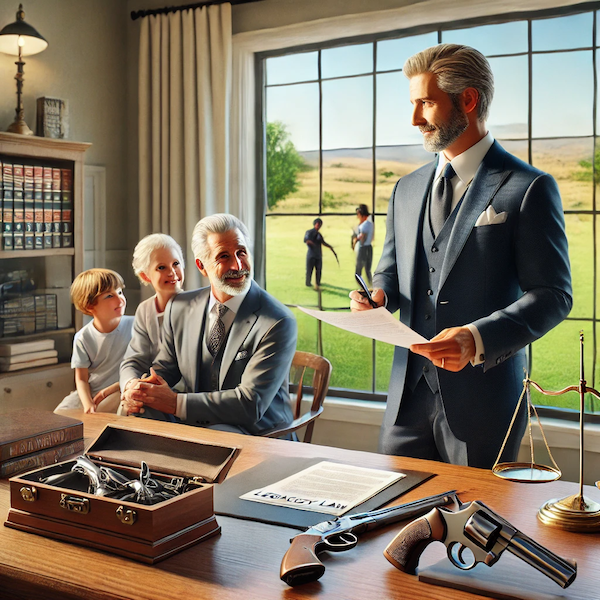- Call Now: (949) 334-7823 Tap Here to Call Us
Bequeathing Guns and Firearms: Essential Considerations for Your Estate Plan

When it comes to estate planning, many people focus on assets like property, investments, and family heirlooms. However, firearms are another important category that requires careful planning to ensure they end up in the right hands. Whether you have a collection of hunting rifles or valuable antique pistols, it’s crucial to consider how these items will be managed after you’re gone.
Why Proper Planning for Firearms Is Crucial
Failing to properly plan for your firearms can result in these cherished items not being passed on to your intended beneficiaries. Family heirlooms could be lost, and valuable collections could be destroyed by law enforcement if not handled correctly. Let’s dive into the key considerations and steps to ensure your firearms are bequeathed according to your wishes.
Important Considerations for Transferring Firearms
When it comes to transferring firearms, there are several critical factors to keep in mind:
1. Legal Compliance: Different types of firearms are subject to various state and federal laws. Traditional firearms like pistols, rifles, and shotguns are primarily governed by state law, but the specifics can vary significantly from one state to another. Additionally, certain firearms and accessories, such as machine guns and suppressors (silencers), are regulated under the National Firearms Act (NFA) and require more sophisticated planning.
2. Eligibility of Beneficiaries: It’s essential to ensure that your intended beneficiaries are legally allowed to own firearms. This includes checking their age, criminal history, and other disqualifying factors under state law. You might even consider running a background check to avoid surprises.
3. Executor Requirements: Your executor must be legally permitted to handle firearms. In some states, executors need a federal firearms license to possess and transfer certain weapons. This becomes even more complex if the firearms need to be transferred across state lines.
Planning for Traditional Firearms
If you simply want to leave a hunting rifle or shotgun to your son or daughter, you might think it’s straightforward. However, there are several nuances to consider:
1. Age and Legal Status: Ensure your child is old enough and legally permitted to own the weapon under state law. This might involve checking for disqualifications such as felony convictions or substance abuse issues.
2. Alternative Beneficiaries: Life is unpredictable, and the person you want to leave your firearm to today might not be eligible in the future. It’s wise to name alternate beneficiaries in your will to cover such possibilities.
3. Executor’s Legal Standing: Verify that your executor can legally possess and transfer the firearm. This may require them to obtain a federal firearms license, especially if they need to cross state lines with the weapon.
Navigating the National Firearms Act
The National Firearms Act (NFA) governs the ownership of more dangerous weapons such as machine guns and silencers. These items must be properly registered with the NFA, and only weapons lawfully possessed before May 19, 1986, can be legally owned. The penalties for non-compliance are severe, including hefty fines and imprisonment.
To ensure compliance with the NFA:
1. Proper Registration: Ensure all NFA weapons are correctly registered. Unregistered weapons cannot be retroactively registered and must be surrendered and destroyed upon discovery.
2. Strict Beneficiary Requirements: Beneficiaries must meet stringent criteria, such as not using marijuana (even if legal in their state) and not having certain misdemeanor convictions, in addition to the usual disqualifications.
The Benefits of a Gun Trust
One effective strategy for managing firearms in your estate is the creation of a gun trust. A gun trust offers several benefits:
– Continued Possession: You can maintain possession of the firearms during your lifetime.
– Expert Management: Appoint a knowledgeable trustee to manage the firearms according to your wishes.
– Generational Planning: Ensure that your firearms can be enjoyed by your children, grandchildren, and even great-grandchildren by keeping them in the trust.
However, setting up a gun trust is complex and should be done with the assistance of an experienced attorney. Avoid using generic forms found online or at gun shows, as they often lack the necessary expertise and customization to meet your specific needs.
Properly planning for the transfer of firearms in your estate is crucial to ensure your wishes are honored and to protect your heirs from potential legal issues. At Alexander Legacy Law, we specialize in estate planning, including the complexities of bequeathing firearms.
Get Assistance Today
Contact me, Jonathan Alexander, for a confidential consultation to discuss your estate planning needs and ensure your firearms are properly managed and passed on to your loved ones. Schedule your consultation today by calling 949-334-7823. Let’s secure your legacy together.





